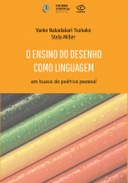Explore

O ensino do desenho como linguagem
Yaeko Nakadakari Tsuhako and Stela Miller
2022
0 Ungluers have
Faved this Work
Login to Fave
Art, understood as a product of the creative work of historically and socially developed individuals, constitutes one of the sources of its humanizing process. On the one hand, when art is produced, it does not only result in artistic objects, but, dialectically, it produces its creator as a human being who, in front of the world, feels, knows, reflects, perceives and takes a stand. On the other hand, the art-enjoying public is also part of
humanizing process, by developing their perception, expanding their knowledge, understanding their reality and, with that, developing capacities such as imagination, reflection, abstraction and conceptualization. Historically, we have seen different views about art that end up influencing the teaching activity in this area, of which we highlight the view of artistic work as a copy of reality, as a photograph or illustration of something real and the view that considers artistic production as fruit of a natural gift or aptitude, received as a divine gift. These visions are present in
more varied forms of artistic production, among them drawing, the focus of the research work presented in this book, which considers, in opposition to these two visions, drawing as language, an artistic form of expression and representation of reality, of an interpretive nature and symbolic, which can be learned as an object of the child's creative activity. In the learning process of drawing thus conceived, the child appropriates
of a certain cultural content and is objectified in the most diverse productions, registering in this object a little of their ideas, knowledge and capacities, thus developing their personal poetics.
This book is included in DOAB.
Why read this book? Have your say.
You must be logged in to comment.
Editions

